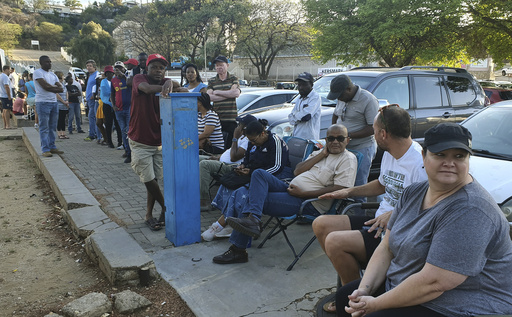
WINDHOEK, Namibia — In a significant development for Namibia’s political landscape, a 72-year-old woman who has been an influential figure in the country’s independence movement since the 1970s is vying to become the first female leader as the nation prepares for a presidential election on Wednesday.
Currently serving as vice president, Netumbo Nandi-Ndaitwah is the candidate for the ruling SWAPO party and has taken the lead following the announcement of early voting results from citizens living abroad and members of the armed forces earlier this month.
Despite being in power since Namibia gained independence from apartheid South Africa in 1990, SWAPO is encountering rising discontent tied to high unemployment rates and economic difficulties, particularly affecting the youth.
This discontent mirrors trends seen in other nations across the region this year, where longstanding ruling parties have suffered significant election setbacks. For example, in June, South Africa’s African National Congress lost its majority, and last month, Botswana’s ruling party experienced a substantial defeat, ending a 58-year reign. Moreover, elections in Mauritius earlier this month saw a surprising defeat for the party holding power.
In Mozambique, the Frelimo party, which has ruled for decades, secured a victory in the October elections, yet was met with violent protests and allegations of electoral fraud.
Approximately 1.4 million Namibians, nearly half the population, are registered to cast their votes to determine both the presidential position and the composition of Parliament. Formerly a German colony, Namibia came under South African administration after World War I. SWAPO played a crucial role in the struggle for the country’s freedom.
Nandi-Ndaitwah is one of fifteen candidates competing for the presidency, including Panduleni Itula, a former dentist who was SWAPO’s closest opponent in the last election, running as an independent. Notably, should no candidate secure over 50% of the vote, which has never occurred in Namibia, a runoff election will be conducted.
Following the death of President Hage Geingob in February, Nangolo Mbumba, who served as vice president, has since assumed the presidency.
Though Nandi-Ndaitwah embodies a rare opportunity for female leadership in Africa, SWAPO’s support has waned, as evidenced by their lowest ever voting share during the previous national elections in 2019.
Having part of her education in the former Soviet Union while in exile amid the struggle for independence, Nandi-Ndaitwah has stressed her commitment to job creation and addressing the youth unemployment rate, which sits at around 20%. She has outlined a plan to invest roughly 85 billion Namibian dollars (approximately $4.7 billion) over five years to generate over 500,000 jobs, although critics consider this goal overly ambitious.
In addition, issues pertinent to women’s rights, such as reproductive health, pay equity, and access to healthcare are likely to be significant factors for voters in a country distinguished by its dramatic landscapes, including the Kalahari Desert and the Namib Desert, with one of the lowest population densities in the world. Currently, just over 3 million individuals inhabit Namibia, a territory more than twice the size of Germany.
